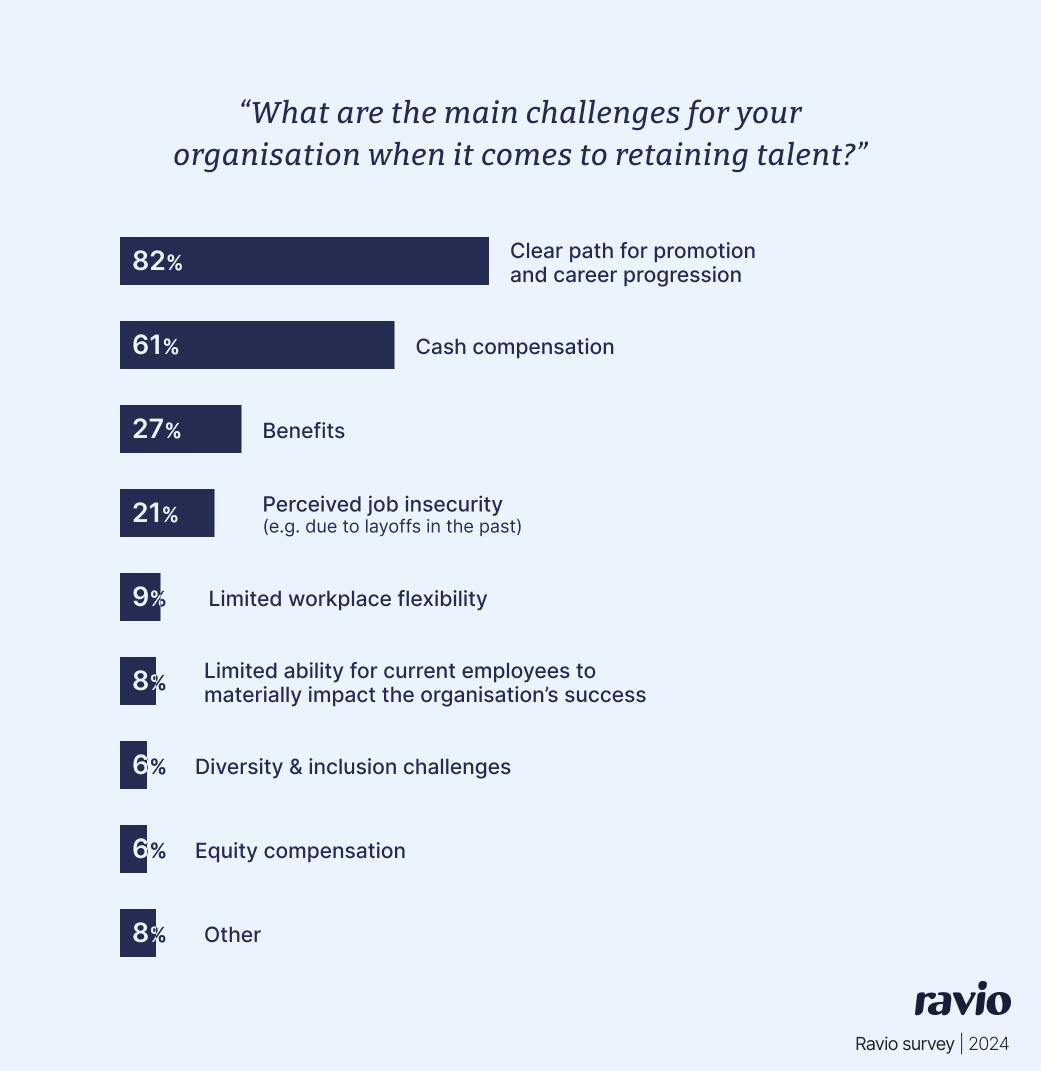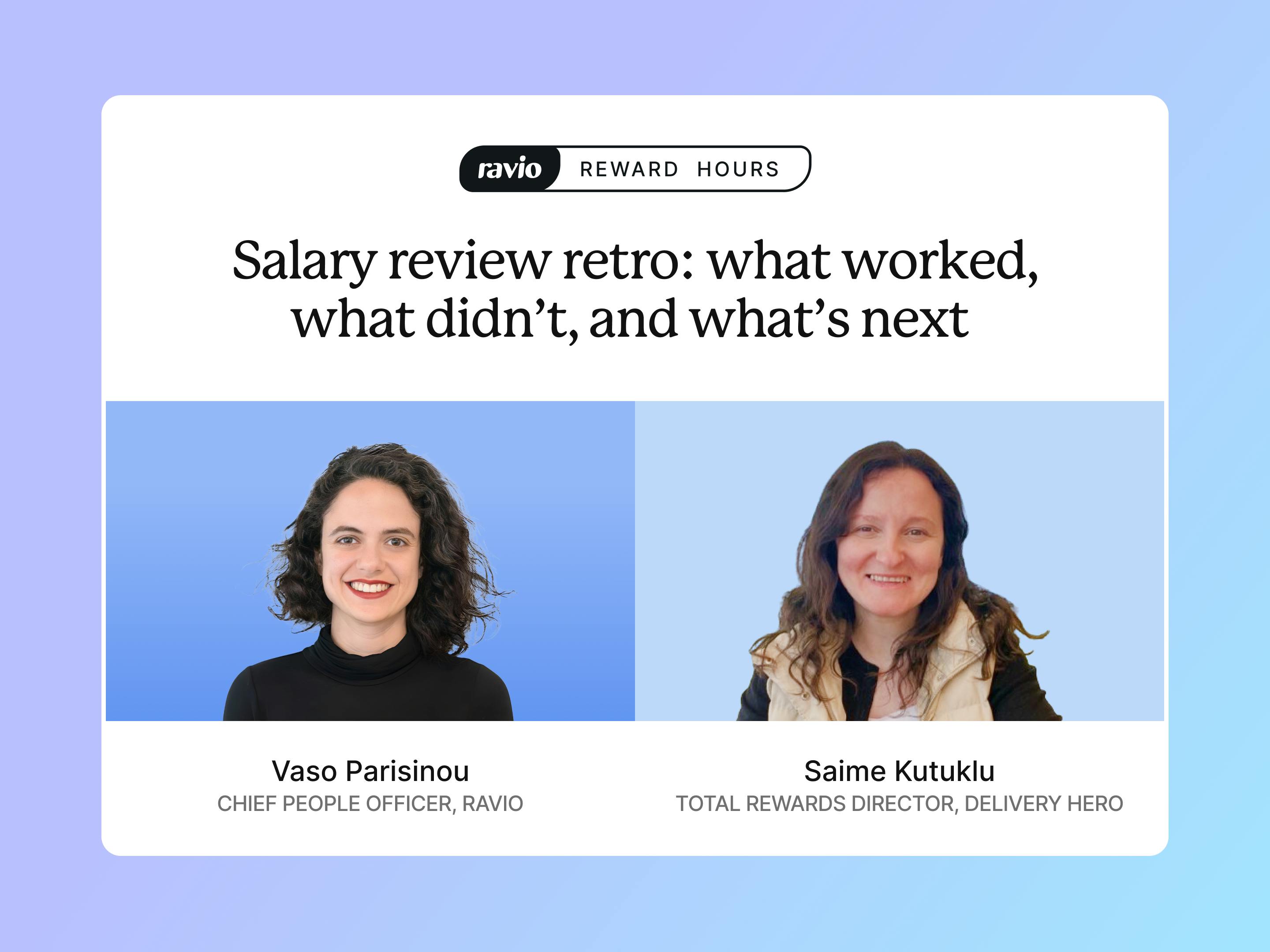- Do you think that rewarding high performers with salary adjustments works?
- Why is communication such a challenge in relation to salary adjustments?
- How can People Teams support managers with salary adjustment conversations?
- If salary adjustments aren’t enough to retain high-performers, what else is needed?
- What can go wrong when companies focus only on salary adjustments and neglect all of these other levers?
- Can you explain a bit more about what you mean by performance management vs performance development?
- Do you have any final pieces of advice on the topic of salary adjustments and retaining high-performing employees?
Salary adjustments are commonly used as a way to ensure that pay remains competitive for top-performing employees – supporting their retention by reducing the chance that they’ll receive a better offer from elsewhere.
Different companies do this in different ways.
Some companies make salary adjustments purely based on performance ratings. Those top performing employees receive an increase, others don’t.
Some companies incorporate market adjustments too, through an approach such as a merit matrix. High performers who are on the lower end of their salary band receive a higher increase, and those that are already in a high position in their salary band receive a lower salary increase.
Some companies account for inflation or cost of living too. Maybe all employees receive a 3% salary increase across-the-board (which could be to reflect market changes too), but high-performers are given an additional salary increase.
Whatever the approach, the outcome is that the highest performing employees in the organisation are rewarded financially for their outsized contribution to company success.
But are salary adjustments actually enough to retain those top-performing employees?
To find out more, we interviewed Figen Zaim, Global Rewards Consultant and Founder of Olivier Rewards Consulting to find out her experience and perspective on this question.

Do you think that rewarding high performers with salary adjustments works?
I’m involved in several forums for Rewards professionals in the tech industry, and pay for performance has been a topic for a long time.
But a few years ago there began to be a trend of Rewards leaders deciding to completely decouple pay from performance.
Then a year later at the next compensation review it seemed most of those leaders were already deciding to immediately re-couple! So there have definitely been mixed feelings since then.
It seemed to me like most of the reasoning behind separating pay and performance stemmed from a lack of willingness (or maybe even nervousness) by managers to make decisions outside of prescribed guidelines.
For example, when a merit matrix was used, in most cases the line managers would just simply agree with the merit increase proposed by the Reward team. Almost like a tick box exercise. Rewards leaders felt that managers were not taking into consideration the day-to-day working context that they were aware of but which Reward teams would have no way of knowing about – reducing the effectiveness of the exercise.
“Line managers have to be effectively engaged in the process for merit increases to be successful, ensuring day-to-day working context is incorporated into decision-making.”
By removing the merit matrix exercise (decoupling pay and performance) and instead providing managers with a set salary increase budget to be allocated to their team, the outcome Reward teams hoped for was a more accurate reflection of employee contributions vs merit increase.
However, they soon found out that this created even more confusion and distrust as employees felt that there was no robust decision making process – it felt to employees like a very subjective way of doing salary adjustments.
But bias is a risk whatever approach you take to compensation reviews, unfortunately. You can’t just erase it.
“Bias is a risk whatever approach you take to compensation reviews – even when you decouple performance from pay decisions, it’s still there.”
There’s no right or wrong approach, you just have to figure out what works best for your company and employees and then equip managers with the information and support they need to make the right decisions.
On a personal level, I do find it’s beneficial to link pay and performance for most teams.
I like to think about compensation and performance in a more holistic way. My specialism is job architecture and levelling, and I strongly believe that it all starts there. The job role and job level sets the foundation through defining the competencies, skills, and level of business impact that an employee should have. Then at the compensation review, it’s a case of comparing the employee’s actual output and impact to that foundation – with the outcome being a pay increase if they’ve exceeded expectations. Of course, some companies will also incorporate market changes into the final pay increase too, which I’d always recommend doing.
This way, it all fits together in a logical way for consistent decision making – and the clear reasoning also makes it much easier for managers to discuss with employees, which can be a challenge.
Subscribe to our newsletter for a monthly treasure trove of insights from Ravio's compensation dataset and network of Rewards experts, to help you navigate a career in compensation 📩
Why is communication such a challenge in relation to salary adjustments?
Pay and performance are very personal issues for employees, and expectation and reality often don’t match.
Employees who receive a salary adjustment might not be happy with the amount received.
Employees who don’t receive a salary adjustment may feel like they deserved one.
Then for line managers, they often struggle with being the person who has to have those difficult conversations with their team members. It can be difficult to handle employees’ frustrations, and it requires clear, open, and honest lines of communication.
“Communicating salary adjustments to employees becomes an issue when their expectation and the reality don’t line up.”
How can People Teams support managers with salary adjustment conversations?
There are two big things that help managers with salary adjustments, in my experience: clear guidelines, and implementing a culture of continuous feedback.
Manager guidelines and education
When it comes to the actual compensation review process, clear guidelines and education on how salary adjustment decisions should be made are a must. I find it helps to explain the consequences for their team if bias does play a big role, causing inconsistencies and pay inequities that can damage trust.
I always recommend spending a lot of time with line managers at the start of the compensation review process to make sure they understand the process and feel comfortable having open conversations with their team members. It’s worth spending that time to make sure the compensation review process runs smoothly, and avoid the People Team getting inundated with messages from frustrated employees.
“Invest a lot of time with line managers at the start of the compensation review process. Make sure they’re comfortable with the process and with having conversations about pay and performance with their team members.”
Some managers will need much more support than others.
I often run 1-2-1 sessions with managers who are feeling particularly nervous about having conversations with employees about their salary adjustment, even role playing the conversation to help them out.
I work with a lot of high-growth startups or scaleups, and I find that in these companies I’ll need to run several of these 1-2-1 sessions. That’s because it’s often the case that high-performing employees have been prematurely promoted into manager roles as the company has experienced a period of high growth, and they don’t have the experience at managing.
A culture of continuous feedback, all year round
The other big factor to remember is that performance and compensation should never be a once-a-year conversation.
“The worst possible thing that a manager can do is to wait for the next compensation review to tell an employee that they aren’t where they should be in terms of performance.”
The employee is left thinking ‘well, if you told me six months ago I could have done something about it and made sure I got my pay increase’. It’s going to be detrimental for the employee-manager relationship, and it’s going to damage employee engagement too.
So, for Reward Leaders, building a culture of continuous feedback, where managers are encouraged to share feedback all year round is important. It means that when it comes to that salary adjustment conversation, the manager and the employee both have a good idea of where things are at, so there are no nasty surprises.
The same is true of positive feedback – performance shouldn’t ever only be rewarded through a once-a-year salary adjustment because that’s never going to be enough to retain those top performers, we should be giving positive reinforcement all year round.
“Reward Leaders should make it a priority to build a culture of continuous feedback between managers and employees.”
If salary adjustments aren’t enough to retain high-performers, what else is needed?
The real beauty of compensation is that we have so many different levers to pull to reward employee’s contributions in different ways:
- Salary adjustments. A salary adjustment for performance gives that financial reward for doing your job really well. Equally, a salary adjustment could also be used to reflect a change in market benchmarks, ensuring that employee compensation remains competitive (which is also important for retention).
- Bonuses. It might be that you choose to give performance bonuses for high-performers, instead of adjusting their base salary. Or it could be a bonus that reflects company performance instead, rewarding employees for their role in business success.
- Equity. An equity refresh grant is another way to financially reward employee performance. Equity is also great as a way to reward employees for their role in company performance too, because if the company continues to be successful then that equity will only become more valuable.
- Employee recognition programmes can also have a hugely positive impact on company culture and employee engagement. They also provide the structure to enable that continuous, year-round feedback that we’ve already touched on.
- Promotions. A promotion to the next job level reflects an employee’s continued high performance, a signal they are ready to take the next step in their career. This, of course, comes with a pay increase too. Supporting high-performing employees to reach the next job level and move their career forwards is a vital lever – there’s really no point in doing performance management without performance development too.
📊 Ravio data insight: poor career progression is the top challenge for retention
To expand on Figen’s point around the importance of career progression clarity for retaining top talent, when we asked People and Reward Leaders the challenges they face when it comes to retaining talent, this lack of clarity around the path for promotion and career progression was the no.1 challenge for 82% of respondents – above compensation (61%).
Read the full report

There are just so many levers to pull to recognise and reward employee contributions.
Really you should be pulling different levers for different employees. You don’t want to give everyone the same reward, because they all bring different levels of contribution, and they will all appreciate different rewards. The key is to invest time in understanding employees on an individual level, which comes back to supporting managers with that process.
“The beauty of compensation is that there are so many levers to pull to reward employee contributions – and different levers work for different employees.”
What can go wrong when companies focus only on salary adjustments and neglect all of these other levers?
Relying on an annual salary adjustment to reward high-performers puts a lot of pressure on that performance management process – and we’ve just seen that this has repercussions in terms of employees starting to look for new challenges elsewhere.
The other side of the coin is that often when employees are asking for a salary increase, it’s because they have some frustrations with their job. Maybe the role isn’t turning out to be a great fit for them, or they have a difficult relationship with their manager.
A salary adjustment will never fix the problem.
More money has the shortest possible shelf life in terms of rewarding employees. It’s an instant positive, but the employee will still wake up tomorrow with the same work, the same colleagues, the same frustrations.
“A salary increase is the employee reward with the shortest possible shelf life in terms of retention.”
In my experience there’s almost always something else lying underneath their ask for a salary increase – they want a change, or they want something more.
Companies that are cash rich will try to “throw money at the problem” with a last chance salary increase offer or panic promotion. Other companies will have to just see the talent walk out of the door – and we all know how expensive it is to replace good people!
It’s well worth the time and effort to ensure those ongoing development conversations are in place so that you can gain an understanding of what each employee wants from the next step in their career. Usually there are pretty easy ways to support employees with what they actually want – whether it’s helping them get involved in a new project, or test out a secondment to a different team, or pairing them with marketers to help them get more personal exposure.
This is ultimately why it’s important to look at performance and salary adjustments holistically. It’s one small part of the full picture of a job architecture, career progression framework, and ongoing development conversation that supports employees to fulfil their long-term potential within a company.
Can you explain a bit more about what you mean by performance management vs performance development?
So I mentioned earlier that there’s no point in doing performance management without performance development.
The distinction is that performance management tends to look backwards, and performance development looks forward.
Performance management is typically that annual or bi-annual review process, which can be associated with a salary adjustment for top performers.
Performance development is an ongoing motion that aims to understand how to help team members grow and develop in ways that will support the next steps they actually want to take in their career.
“In my experience, companies spend too much time thinking about performance management, and not enough time thinking about performance development.”
The most important moment actually happens after a high-performing employee has received their salary adjustment.
It’s not a case of job done, they’ve received their pay increase.
That high-performing employee is already going to be hungry for what comes next. They want to be challenged, they want to know what the next level looks like and how they can work towards that. If they don’t get that internally, they’ll start looking elsewhere for it.
So framing performance management as one small part of a bigger, ongoing conversation of performance development is always going to be more constructive for both employee and employer.
Do you have any final pieces of advice on the topic of salary adjustments and retaining high-performing employees?
Whatever you do, make it meaningful.
For employees, what resonates is knowing that the organisation has your best interests at heart and is doing something meaningful to recognise your contributions and support you with your next steps – whether that’s a pay increase, a promotion, a great benefits package, etc.
For employers, bringing employee experience into the heart of it means that you’re way more likely to cultivate happy and loyal employees, and retain those high-performers.
Compensation reviews and performance reviews take a lot of time, effort, and money to run, so it’s important that they have the desired impact – failing at the last hurdle is the worst feeling ever.
About Figen
Figen Zaim is a Total Rewards professional with 20 years of experience specialising in job architecture and compensation. She has been consistently successful at developing and reshaping Rewards programmes, with particular expertise in job architecture and reward structures.
Figen is now the Founder and Managing Consultant at Olivier Reward Consulting, where she leads a team which supports companies of all sizes and stages with the design and implementation of various HR systems and processes. Clients include WeTransfer, Mollie, and Forto.



